Jazz Fest Day 8: Big crowds turn out as Jazz Fest 2024 comes to a close.
Jimmy Buffett Tribute
The Jimmy Buffett tribute set had one thing in common with the Rolling Stones set: Both were highlighted by Irma Thomas. She was the featured singer on “I Will Play for Gumbo,” a song whose sentiments are a bit outside her usual wheelhouse (“It’s a little like religion and a lot like sex, you should never know where you’re going to get it next”)—and she appeared to be having the time of her life singing it, with added fuel from Sonny Landreth‘s guitar. Though any number of big-name guests were rumored, it’s probably fitting that the only guest stars were local ones: Trombone Shorty added a playful solo on “Pencil Thin Moustache,” and four of the Preservation Hall Jazz Band andadded horns to “University of Bourbon Street”—the last of Buffett’s many odes to this city, and one he never got to play live (Texas songwriter Will Kimbrough, who wrote it with Buffett, did the vocal honors). Vocals were otherwise split between various Coral Reefer Band members, and while Buffett always peppered his lyrics with jokes and ad-libs, they played the songs strictly as written—with one notable exception. “A Pirate Looks at 40” was sung by Mac McAnally, who was a close friend of Buffett’s as well as a longtime collaborator. When he came to the line about “just a few friends” he shouted “A whole fairground full of friends—are you seeing this, Jimmy?” No dry eyes among the Parrotheads there.
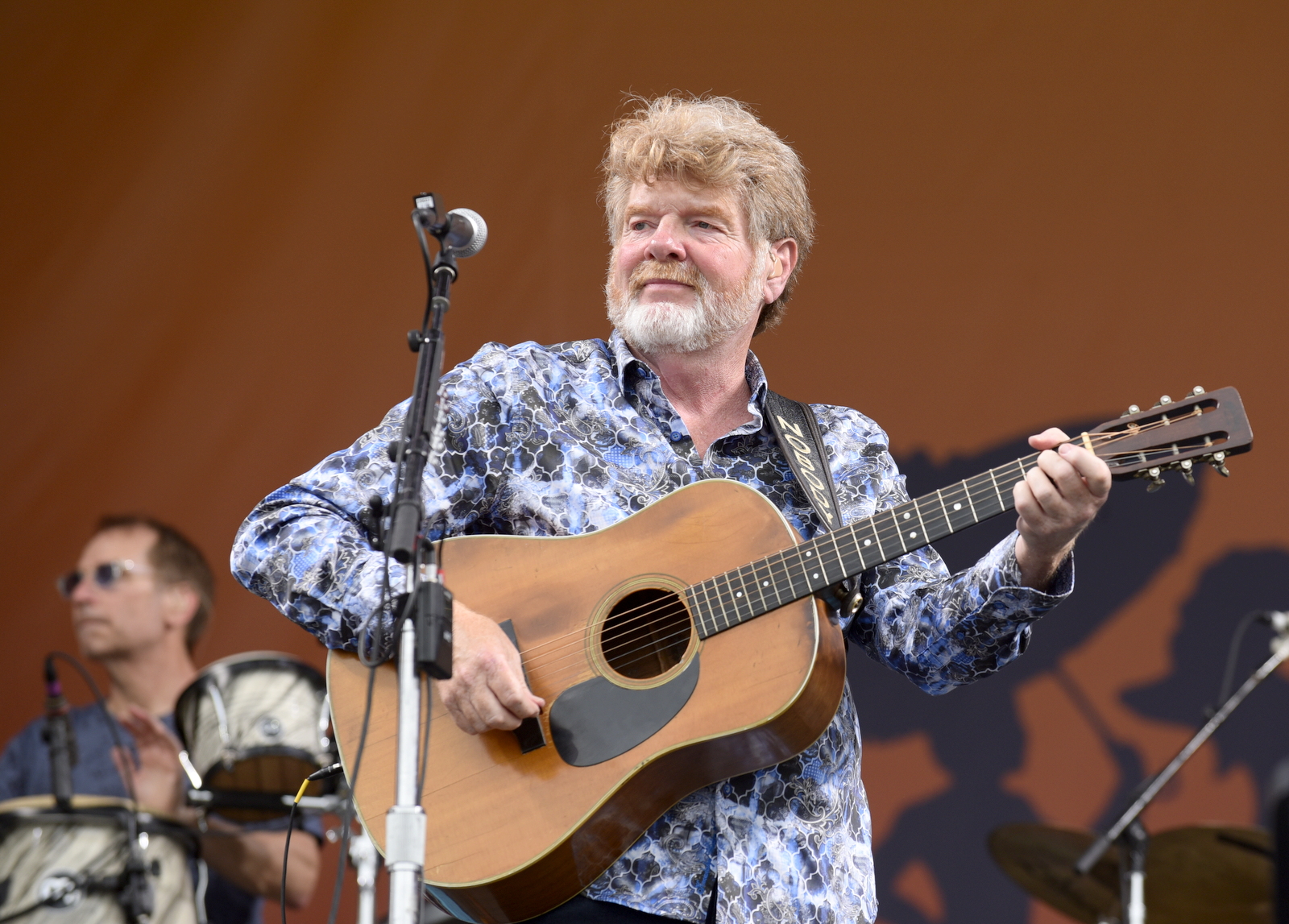
Mac McAnally. Photo by OffBeat / Kim Welsh
George Thorogood
Last year at this time, George Thorogood posted online that he was facing severe (and never specified) health issues, which required immediate surgery and months of recuperation. So, it was a special kick to see him play at the Blues Tent, still looking and sounding much younger than his 74 years. Thorogood made his vinyl debut in the year of punk 1977 and while he always denied there was any connection, his music always sounded like a punkish take on the blues. That thankfully hasn’t changed, with hits like “Move It On Over,” “Bad to the Bone” and “Get a Haircut” all finding him throttling the slide guitar and kicking the tempos ever further into overdrive.
Tower of Power
Whose bright idea was it to put Tower of Power and Earth, Wind & Fire—the only ’70s vintage soul/funk bands playing the Fest this year—in the same time slot? In any case, the first half of Tower of Power’s set in the Jazz Tent proved satisfying, though the young lead singer Jordan John, who only joined this year, has a bit of American Idol slickness he could stand to lose. But the horn section remains impeccable, and the setlist was a reminder of how many Tower of Power songs are in praise of the music itself: “We Came to Play,” “Soul Vaccination,” “You Got to Funkafize,” “Soul With a Capital S.” While much of the set was given to hits, they included a vintage instrumental, “Squib Cakes,” which showed that the band’s funky good spirits have always been bolstered by serious chops.
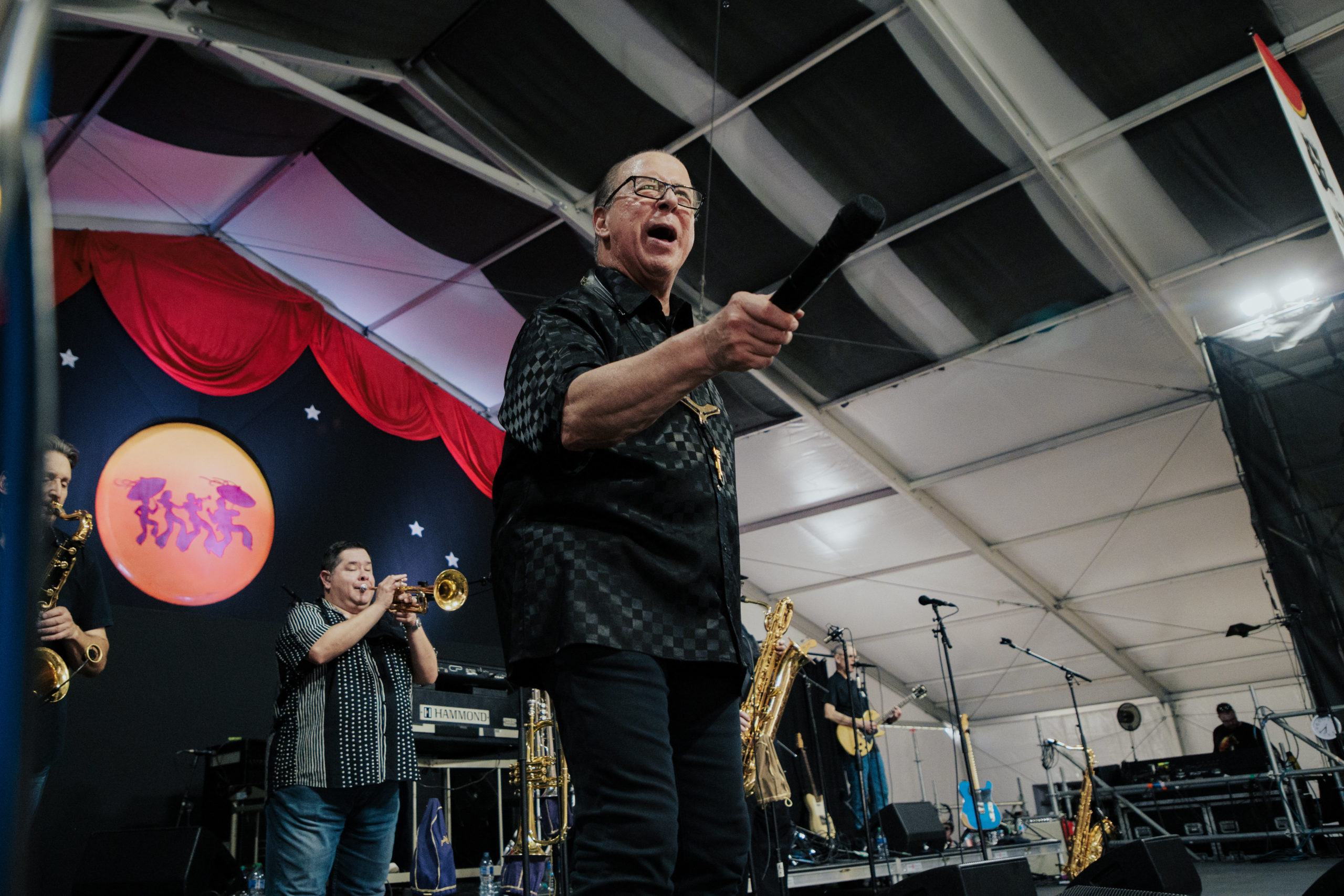
Tower of Power. Photo OffBeat / Noe Cugny
Johnny J & the Hitmen
“And now, a song by the great Tex Rubinowitz.” Those aren’t words you often hear at Jazz Fest—or really, anywhere else. But local blues/rockabilly fixture Johnny J & the Hitmen are clearly a band with a sense of musical history; it’s not for nothing that kindred spirit Alex Chilton produced one of their early albums. They brought to the Blues Tent the feel of a roadhouse with a well-stocked jukebox—including, yes, Tex Rubinowitz’s one and only cult-classic Sun single, “Hot Rod Man.”
A few random things I liked this year:
The “Rhythmpourium” has become a full-time stage, effectively doubling the timeslots for the less-classifiable local bands who normally play Lagniappe.
Somebody finally repositioned the bleachers at Fais Do Do so they look directly at the stage, not at an angle past it.
The endless lines that resulted from the switch to cashless transactions, and made the food experience rather a trial last year, have pretty much been alleviated. How was this accomplished? The credit card machines now have tappers that work. You tap, they beep, you’re done. American ingenuity at its finest.
—Brett Milano
George Thorogood’s first favorite song was also his mother’s favorite, “Beautiful Dreamer,” a Stephen Foster song written during the Civil War. It’s a sweet and sentimental ballad and a surprise pick as the best song of all time from the guy who gave us “Bad to the Bone.” But it was just the first humorous and interesting thing Thorogood revealed at his talk on the Alison Miner stage. (Thorogood wanted to know—only half-seriously—if he had drawn the biggest audience of the Fest at that stage; it was close between Rhiannon Giddens and himself.) The blues-rock legend was, of course, more inspired by ‘60s bluesmen and rockers than Foster: Jimi Hendrix, Hound Dog Taylor, and Eric Burdon were among the names he mentioned. “We didn’t talk about sports, girls, nothing,” he says of his teen years. “Nothing but music.” When his parents confronted him over his life plans, his mother surprising agreed with his decision to pursue rock stardom: “You gotta do it,” she apparently said. “I mean, George, you can’t work.”
At his first gig at the University of Delaware, his band played the one song they had down: “One Bourbon, One Scotch, One Beer,” the blues number that Thorogood and his band the Destroyers made into a classic rock radio staple. (“He was a rock star. Maybe we didn’t think he was,” one classmate recalled, “but he thought he was!”) When he learned he had a radio hit on his hands, Thorogood joked that his reaction was: “We’re not supposed to be on the radio. I’m an artist.” When “Bad to the Bone” suddenly blared over the PA, someone in the crowd yelled: “Turn it up.” But Thorogood was clearly uncomfortable (or maybe just bored) hearing his voice come back. When someone asked why he played so loudly, leading to temporary deafness in his audiences, Thorogood compared his philosophy to a Chevy Nova—one had to floor the old clunker or it would stall; the same, he explained, went for the Destroyers’ early equipment.
Later that afternoon, in one of the unquestionable highlights of the entire Fest, Thorogood, who had arrived with a cane, played guitar in the Blues Tent while walking backwards, flailed around, raised his arms in a weightlifter-like pose, and generally seemed like a completely different person. He played a blistering, live-album-worthy version of Hank Williams’ “Move It On Over,” followed it with Van Morrison’s “Gloria,” complete with a full-audience call-and-response and everyone on their feet, before closing with “Bone,” as David Geffen called it. His goal, he claimed earlier in the day, was to always “play or perform something they’ll remember for the rest of their lives.” He’s done it.
The Coral Reefer Band paid tribute to their dearly-departed Jazz Fest fave and bandleader Jimmy Buffett at the Festival Stage, kicking things off with “It’s Five O’Clock Somewhere,” Buffett’s only post-70s pop hit and his only award-winner. When “Changes in Latitudes, Changes in Attitudes” followed, it seemed like the band would dispense with the most popular songs and then move into obscurities early on, but not so: after bringing out Irma Thomas for “I Will Play for Gumbo,” they went into the lesser-known/fan faves/hidden gems early, eventually covering Crosby, Stills & Nash and the Grateful Dead, both surprise choices, before extending their time to do the essentials, including “Fins” and “Margaritaville.” They also brought out Preservation Hall and Trombone Shorty on some of the more obscure songs, the perfect lead-in to Trombone Shorty’s headline set and Fest closer. Regardless of how one feels about Buffett’s music, it has to feel like the melancholic end of an era to say goodbye to Buffett and the Coral Reefer Band.
It’s a toss-up whether the best set of the 2024 New Orleans Jazz & Heritage Festival was courtesy of Thorogood or the one courtesy of Bonnie Raitt at the Gentilly Stage. (Wouldn’t that have been a great back-to-back finale for that venue? Jazz Fest Booking Team, please make it happen in 2025.) Raitt, who is also 74, looked absolutely fantastic playing slide guitar with her trademark streak of white hair and colorful outfit, playing mind-boggling blues riffs that drew the attention of the camera operator for the stage, who kept showing close-ups or her hands working the frets at a dizzying pace, all without showing signs of fatigue. When she took a “break” to play sitting on a stool, she apologized, then lit into an excellent version of Bob Dylan’s “Million Miles” with much improvisational guitarwork nonetheless. After, she bounced back to her feet, muttered: “This isn’t on the setlist,” and went straight into “Something to Talk About,” her blockbuster 1990 hit. The crowd went wild and scrambled for their phones, but despite Raitt’s apparent boredom with her signature tune, she found something new in it and improvised her way out of the choruses. It was a masterful demonstration.
—Brian Fairbanks
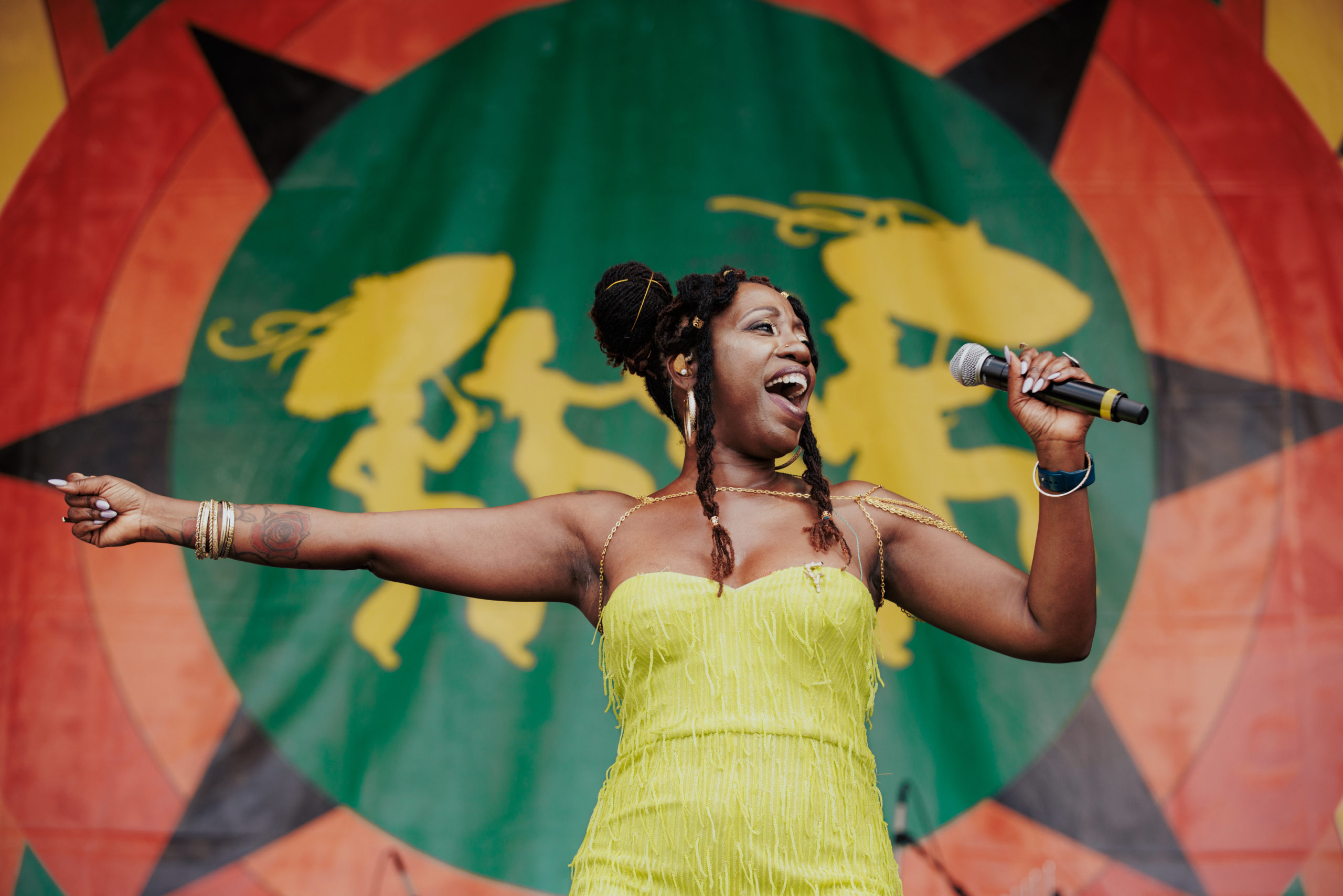
Erica Falls. Photo by OffBeat / Noe Cugny
My final day of Jazz Fest was bookended by choreography and the four elements while being filled with good energy and wonder. The last day is when you finally make it to that food booth you’ve been wanting to hit or have your favorite dish once again. It’s that day when even though you’re thoroughly exhausted, you’re also not wanting the exhilaration to end.
Water Seed
Starting the daylight with lemonade from an enterprising family outside the gates and Shrimp Yakisoba from Ajun Cajun was the ideal way to catch high-energy Water Seed at the big Festival Stage. Lou Hill and the band wasted no time in showing the Sunday crowd what they were about, kicking off with “Give You Up,” featuring a funky flute and keytar breakdown from Cenise Love & Jentleman Sharp and a scorching guitar solo from Grant Hudson. Rocker “Starz” sent 17-year-old Miles Sam to the forefront for his own guitar solo. Add in Casme’s lead vocals and performance on “Everything,” Kr3wcial stepping up to rap on “Too Hott,” and so much more to make for a band that stands on business when they put on a show.
La Trank-K
One of the great things about Jazz Fest is finally catching some of the great local acts you’ve been wanting to see. Sunday served that purpose very well, beginning with coming upon the Cultural Exchange Pavilion to find talented La Trank-K showing why they have been steadily growing in profile with a range of latin music. They were one of several New Orleans groups seen over the past couple weeks of Jazz Fest who I can’t wait to catch again.
Erica Falls
You know Erica Falls and Vintage Soul will bring it, and they sure did at the Congo Square Stage, getting the party started as Falls sang “the 9th ward way” like “red beans and gumbo.” About a third of the way in, “Up” hit especially well with the crowd as did a cover of “That’s the Way of the World” by the band who would later be headlining that same stage. Falls believes in the power of music and raising your head to the sky. It shows and she glows in front of the mic. Here’s what you also can expect from an Erica Falls performance—the background vocals will be as good as it gets, by sheer necessity.
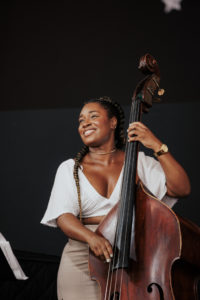
Amina Scott. Photo OffBeat / Noe Cugny
Amina Scott
While heading over by the big tents, I made a pit-stop to get a plate of BBQ Pork Ribs from the friendly folks at Down Home Creole Cookin’. That, with white beans on the side, and good conversation from some Bay Area Jazz Festers, hit the spot to catch bassist and composer Amina Scott at the WWOZ Jazz Tent. Scott had a top-quality set and debuted some new innovative and nuanced pieces that went over well with their qualities brought to life by a stellar band that included Oscar Rossignoli on piano, Gladney on saxophone, Peter Varnado on drums, and Steve Lands on trumpet.
Quiana Lynell
After those heights, the only course is a stylistic switch-up, and it was coming in full force. Quiana Lynell tells the truth. She also knows how to make a resplendent entrance of style and substance, singing just offstage like an invocation before entering and letting her instrument guide and glide her in front of an awaiting audience. As sharp as her band was, the moments of solely vocals and piano allowed the crystalline Lynell to dip, soar, and tease out lovely subtleties. It was no surprise to find that she and pianist Daniel Meinecke have been collaborating for years. Lynell announced, “We’re going to Jazz Church this afternoon” and “Welcome to the church of love,” and she was true to her word on both counts, even tucking a few bars of Chic’s “I Want Your Love” into a set of strong originals. One can’t help but wonder what’s coming next from her.
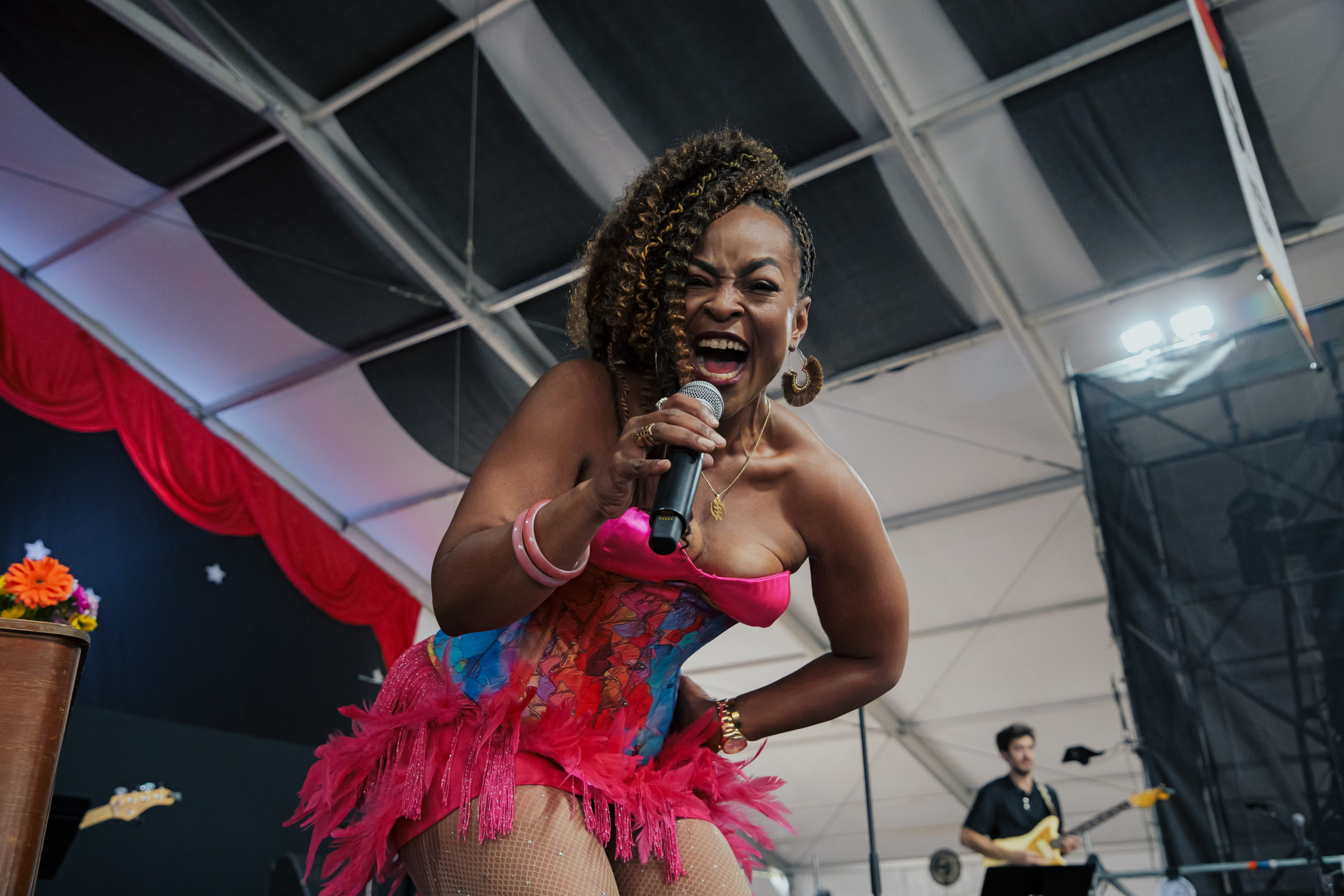
Quiana Lynell. Photo by OffBeat / Noe Cugny
Jeffrey Osborne
The great thing about the Congo Square Stage on Sunday was that it featured two back-to-back headliners, legends Jeffrey Osborne and Earth, Wind & Fire. All the world’s a stage to consummate showman Osborne who not only entered while singing and walking across the lawn but also was back down performing among the crowd later in the set. He asked, “Do we have any L.T.D. fans in the house?” before thrilling with “Holding On (When Love Is Gone),” and shouted out producer and collaborator George Duke before soaring with “On the Wings of Love.” An unintentionally humorous moment was when Osborne said, “I’m about to set you up for the night right now. All these beautiful ladies. Sing to them,” engaging the crowd to sing “Let me make sweet love to you baby,” only to find the men were lackluster and the women killed it on their turn. It was a perfect old-school set that included Osborne doing a bit of Rick James’ “Give It to Me Baby,” and an extended version of arguably the best love song ever written, “Love Ballad.” Add in a rousing “Stay With Me Tonight,” a crowd competition at singing the chorus of “You Should Be Mine (The Woo Woo Song),” and much more. Osborne was as energized at the end of his show as he was at the beginning, maybe more so. It says a lot that he has so many hits that one show is not enough to perform them all. That also applies to the next act.
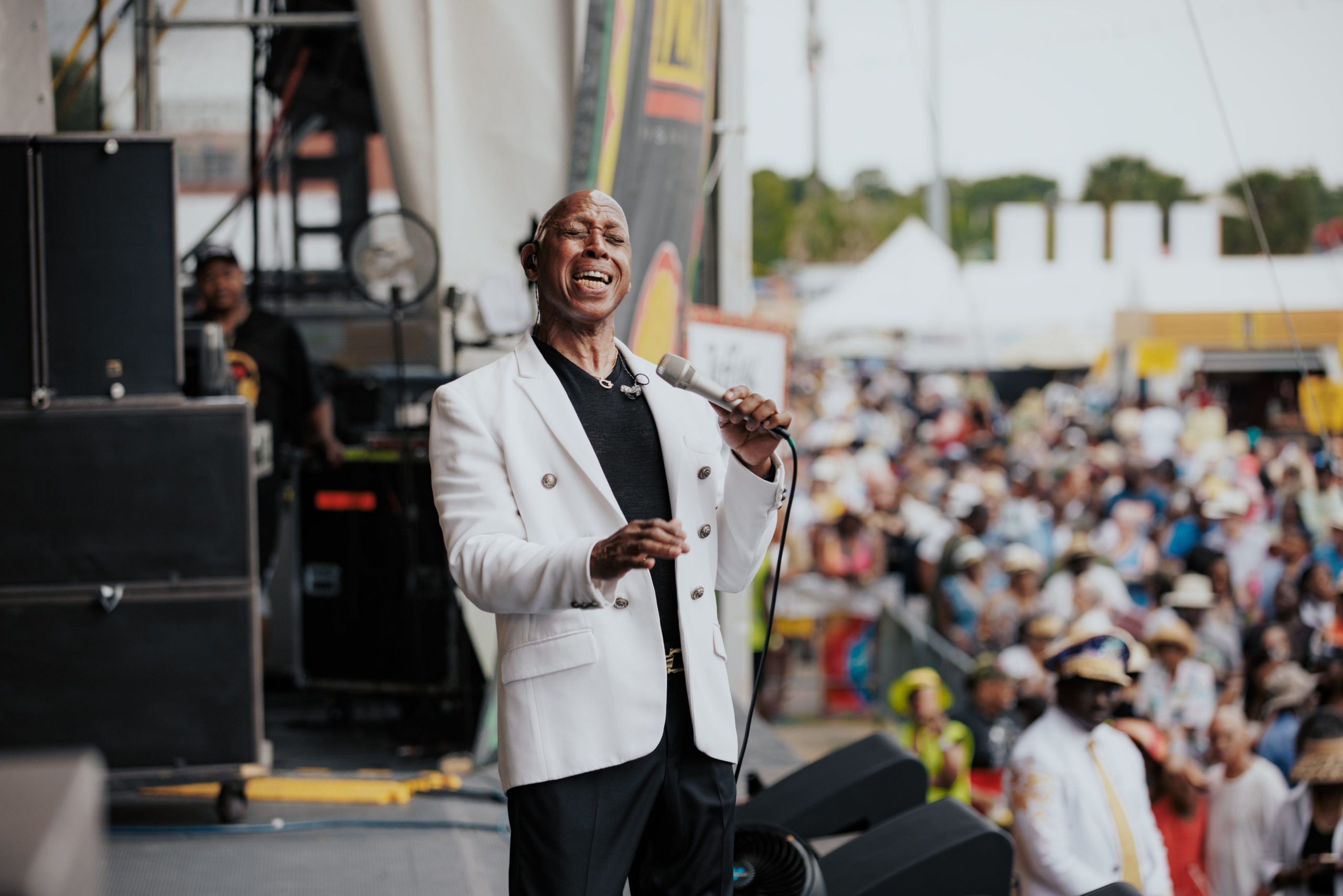
Jeffrey Osborne. Photo by OffBeat / Noe Cugny
Earth Wind & Fire
If it was possible for the sea of people to expand just a bit more for Earth, Wind & Fire, it somehow happened. Seeing original member (and brother of the late founder Maurice White) Verdine White enter the stage with his bass to play “Shining Star” was the moment that gave me most pause on Sunday. It’s not only striking when you see Earth Wind & Fire live to witness the range of musical styles that they’ve incorporated into catchy songs, but also that they don’t stop moving. There is consistent choreography, including that by the horn section as they’re playing crisp parts as identifiable as any in music. The hits were hitting, including “Sing a Song,” “After the Love Has Gone,” “Boogie Wonderland,” “September,” “Let’s Groove,” and “That’s the Way of the World.” What struck about Earth Wind & Fire was that as innovative as they’ve been since their self-titled debut album dropped in 1971 (and had reviewers confounded on how to identify their sound with so many genres in it), the visual base of their live show is classic choreography. How appropriate that Earth, Wind & Fire are seeing their influence play out with a New Orleans group called Water Seed to complete the elements.
—Michael Allen Zell



